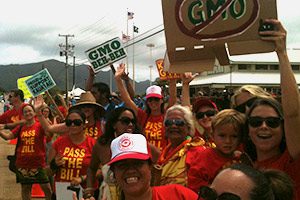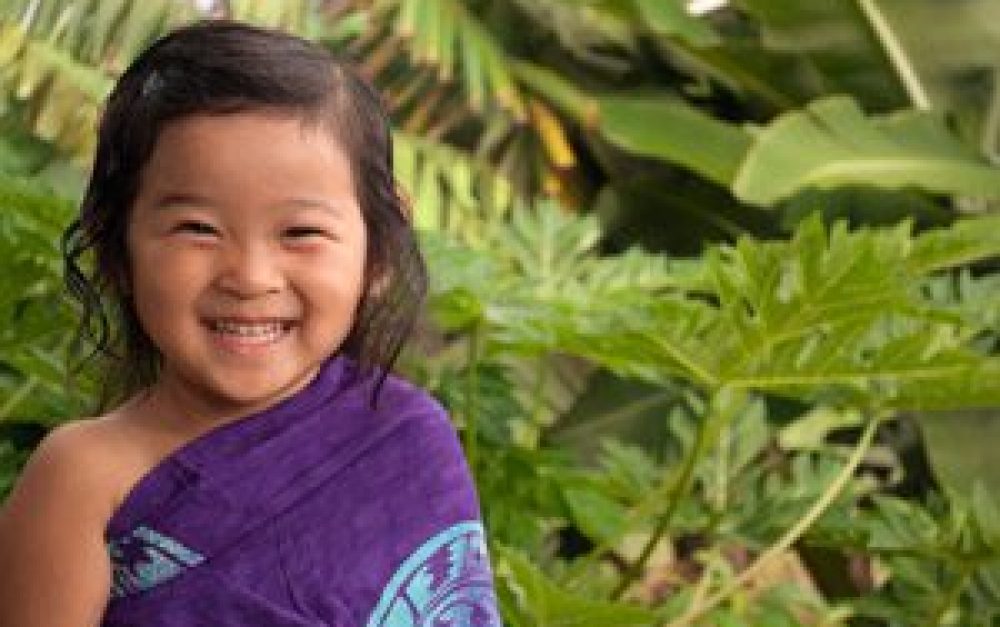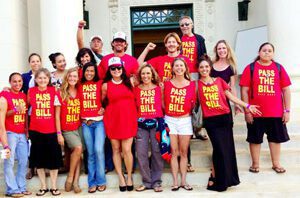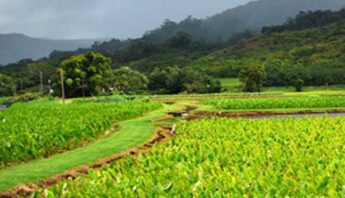Health professionals from across Kaua’i are drawing attention to the growing use of hazardous pesticides on the Garden Island. Nurses, pediatricians and other health care practitioners testified before the Kaua’i County Council yesterday, urging leaders to adopt legislation that would better protect the island’s residents, especially children. But global pesticide corporations won’t swallow that pill so easily.
The small island has drawn increasing attention, as it has become an epicenter of operations for global pesticide corporations testing genetically engineered (GE) seeds. As I’ve noted before, the county bill would take steps to provide physicians and families with better information about the pesticides used, including a pesticide use registry.
But five of the world’s six largest pesticide corporations — Bayer, BASF, Dow, DuPont (Pioneer) and Syngenta — are doing their best to keep Kaua'ians in the dark. In addition to full-page ads in newspapers, the companies operating under the banner of the Hawai'i Crop Improvement Association (misnomer?), are running push-polling through off-island telemarketers to convince Kaua'ians to oppose current disclosure efforts.
Chris Broussard, vice-president of the Hawai'i Nurses Association put it like this.
"What is truly at the core of this issue is our right to know what we’re being exposed to. The fact that corporations want to hide this information sends a very obvious message. There’s something worth hiding."
As my colleague Dr. Marcia Ishii-Eiteman has pointed out on several occasions, many GE crops are designed to drive up pesticide use. So it should be no surprise that pesticide use on the island is great — over 18 tons of “restricted-use” pesticides in 2012 alone.
Doctors are taking the large-scale use of these pesticides seriously. Dr. Lee Evslin, a Kaua’i pediatrician, brought a letter signed by 15 island pediatricians to yesterday’s hearing. A passage from the letter reads:
"Overall, [the American Academy of Pediatrics] expresses a serious concern regarding the use of pesticides in our homes, our gardens, our food production. They also express a growing concern that residents of farming communities may be at an even greater risk. On Kaua'i, our risk may be even larger as our exposure may be multiplied by the nature of the crops being grown here and the particularly heavy use of pesticides."
 The health care practitioners were joined by hundreds of mothers, farmers and small business owners at yesterday’s hearing that stretched well into the late evening hours. A sea of red shirts inside and outside the hearing urged residents to “Pass the Bill.” In fact, there were so many attendees, the Council had to find a larger hearing venue a few days prior. The momentum to pass the bill has only grown as more and more evidence comes to light about pesticides used on the Garden Island.
The health care practitioners were joined by hundreds of mothers, farmers and small business owners at yesterday’s hearing that stretched well into the late evening hours. A sea of red shirts inside and outside the hearing urged residents to “Pass the Bill.” In fact, there were so many attendees, the Council had to find a larger hearing venue a few days prior. The momentum to pass the bill has only grown as more and more evidence comes to light about pesticides used on the Garden Island.
Charting harm
A group of public health officials invited PAN to review information about pesticide use on the island. On Monday, we released a brief documenting the widespread use of hazardous pesticides. Margaret Maupin, a nurse practitioner who has witnessed an increasingly large number of adverse health impacts on the West side of Kaua’i, said:
“We must act with caution and the best available scientific information to ensure the safety and success of the island’s children.”
Through research, PAN learned that several restricted-use pesticides are used in large amounts, especially on Kauai’s west side. As a result of the high levels of use, we join concerned community members in urging policymakers to implement pesticide use reporting, ensure better evaluation of pesticides and their impacts to health and environment, and find ways to help farmers transition to sustainable farming practices.
 Health-harming pesticides can travel from where they're applied in the field, and have been found in air and water of Kaua’i schools. Even in very small amounts, these pesticides are linked to profound impacts on children’s health and intelligence.
Health-harming pesticides can travel from where they're applied in the field, and have been found in air and water of Kaua’i schools. Even in very small amounts, these pesticides are linked to profound impacts on children’s health and intelligence.
For example, independent studies find the following health harms, even at low levels of exposure:
- Chlorpyrifos: Prenatal exposure is associated with a decrease in IQ and harm to brain development
- Atrazine: Prenatal exposure is linked to low birth weight and increased chance of birth defects
Families fight for rights
Mothers on Kaua’i are raising their voices for pesticide protections, too, and joining the call for policymakers to ensure information and the best safeguards possible for their children's health. Lorilani Keohokalole-Torio, a Kaua’ian mother who has worked with mothers across the island shared these words on Monday:
"The pesticide poisoning of the ‘aina (land) is a direct disconnection from having a relationship with the ‘aina…Pesticides have been linked to illness in children. By air, water, land and on food. Taking action now to prevent more unforeseen illness in our families is critical."
Yesterday's hearing was yet another measure of Kauai'ians — especially physicians and mothers — standing up to powerful pesticide corporations and highlighting the science and evidence of pesticide harms to children. Rooted in and committed to the long-term health of Kaua'i, the power of this community in action is strong.








